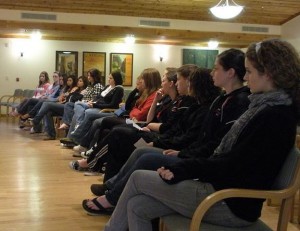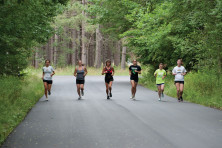Teaching Beyond the Textbook
- Share
- Tweet
- Pin
- Share
In June, about 350 young men and women will graduate from five Door County High schools. They’ll walk stiff and halting across a stage, trying not to look awkward in front of family and friends, and trying to remember the right way to turn.
A diploma will be handed to them, they’ll toss their caps, and there will be talk of how much they’ve accomplished, how proud they’ve made their families and community, and how much they’ve learned. Thrown in will be a few subtle warnings about the challenges to come, but the day will be dominated by talk of unlimited possibilities. Of becoming doctors, teachers, and leaders.
There are other truths that will be left unspoken.
These graduates, like those who came before them, will encounter difficult decisions about alcohol, drugs, and relationships. They will face disappointment – grades may not meet expectations, relationships may fail, credit card bills will mount, certainties will become uncertain.
For these challenges, there are no textbooks, no illustrated guides, and no fill-in-the-blank answers. In these, the most difficult of life’s challenges, our youth too often fend for themselves.
“I kept telling myself I was going to handle this, that I didn’t need help.”
Those are the words of Nicole, a 24-year-old Door County woman who spoke to area high school seniors April 30 at Senior Survival, an event sponsored by the Family Centers of Door County at Bjorklunden in Baileys Harbor. Nicole, who wished to have her last name withheld, was talking to students from Gibraltar, Sevastopol, and Washington Island schools about her struggle with drugs, alcohol and abuse.
Nicole said she grew up in a loving, normal home but struggled with a strong desire to fit in somewhere.
“I was willing to do whatever it took to be popular,” she said. “I tried everything to find out what I was good at.” Eventually, trying everything led to trying alcohol after her junior prom. “I didn’t drink a lot, but I drank enough to know I had arrived, that this is where I fit in.”
Under the influence of alcohol, the world seemed less scary. She started partying once a month, then every weekend, and when she started, she couldn’t stop. During her senior year her once solid grades slid, thanks to her drinking. When she tried massage school after high school, she found that coming home to party was simply more important than school.
“Everything was coming second to drinking,” she said. Between 2005 and 2007, she got three OWIs and started using cocaine, then crack. Despite the obvious signs that her life was slipping out of her control, she remained reluctant to reach out for help. But as she languished in jail after her third OWI in December of 2007, she glimpsed a bit of clarity. About 15 days into her stay, a trip back to childhood slapped her across the face.
“I thought about being a little girl and what I wanted to do with my life,” she recalled. “And this, where I was, was not how I pictured my life. And I knew then that things had to change.”
She still thought she could do it herself, but on New Year’s Eve she drank herself into an alcohol-induced coma. Three days later she checked into the Jackie Nitschke Center. She checked out 28 days later and has been sober ever since.
It’s stories like Nicole’s that inspired Senior Survival, which started four years ago as the brainchild of Kathy Schultz and the Family Centers.
“We realized that our schools do an excellent job of preparing our kids for college or work, as far as book learning,” Schultz said. “But so much emphasis has been placed on standardized tests and college prep, and we felt that often there is not enough time for some of those basic life skills that kids need; that are taken for granted or not even thought about.”
The transfer of a tassel marks an achievement in perseverance, but it does not suddenly bestow a child the wisdom of an experience. In trying to bridge that gap, Senior Survival featured four short sessions for the students. Gay Pustaver of FISC presented a short lesson on personal finance, and Melissa Emery of the Door County Job Center talked to groups about preparing for the job market. Nicole was joined by Hervey Hodges to talk to the kids about some of the non-academic challenges they’ll face at college, and Imagination Theatre discussed relationship situations.
“These kids grow up in the Door County bubble, where nobody locks their doors and everyone’s nice,” Schultz said. “But that’s not the real world. I hope that today’s program sparks conversation between the youth and their parents.”
Pustaver used examples of financial pinches she’s seen from real clients, such as a 24-year-old man with a DUI conviction saddled with a $3,600 annual bill for car insurance who was still trying to keep his truck. She emphasized the importance of setting financial priorities.
“When people come into my office and fill out a budget worksheet,” she said, “they almost always leave the line for savings blank. That’s a bad sign.”
Pustaver recommends saving 10 – 20 percent of income, but recognizes it will take more than her words to penetrate the minds of a room full of 18-year-olds.
“You can talk till you’re blue in the face, but until they have to do it, it just doesn’t make sense to them,” she said.
Emery shared a few tips that she hopes stick with students when it’s time to search for jobs.
“Beware of the electronic you,” she said. She suggested they Google their names, and be mindful of the pictures they put online or that friends post, as employers today will search for information about you on Myspace and Facebook in addition to your references. “What you do today is going to affect you tomorrow,” she warned, “so don’t use sexygirll66 as your email address.”
At its heart, Senior Survival was not about scare tactics or even the unsettling scenarios played out throughout in the day’s sessions. It was about reminding students of the caring community available to help them get through the rough patches that are inevitable in the years to come.
There will be setbacks, and there will be disappointments. There will be mistakes, and some of them will seem insurmountable. But life is made of many days, and no problem, no mistake, has to shape them all.
“Growing up in Milwaukee, I didn’t have the numbers to call,” Hodges told the seniors. “You guys are fortunate because you live in this tight little community that loves you and cares about you.”
There are no magic answers, but by using the resources in this community, the students were told they can overcome the hurdles they’ll face. Nicole has been sober for 18 months thanks in part to some of those resources, but she’s committed to taking it one day at a time.
“I know that I can go 24 hours without drinking,” she said. “But I don’t know that I can say I’ll never have a drink again. Every morning I wake up and start over.”
After all her mistakes and setbacks, she’s sober and she’s going back to school in the fall, leaning toward pursuing psychology, but still undecided.
“I want to try everything,” she said. “Because now I have choices. When I was drinking, I didn’t have any choices.”
Door and Kewaunee County Alcoholics Anonymous
800.746.0901



